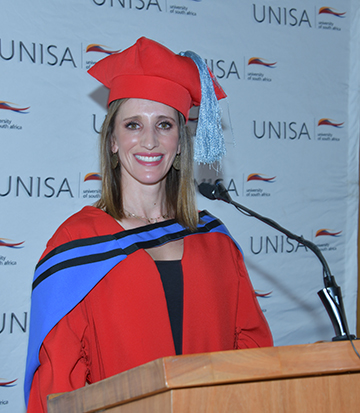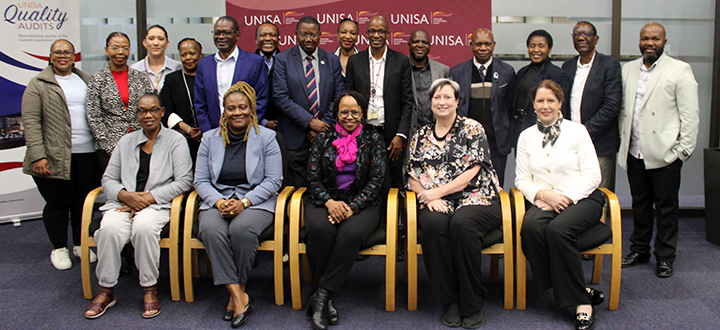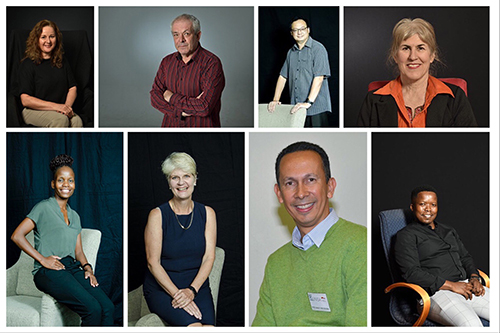College of Economic & Management Sciences
Remote working not as positive as expected

Prof Ingrid Potgieter
“Research published before the start of the COVID-19 pandemic suggests that individuals believe that if they are given the flexibility to work remotely, they will be more productive and experience higher levels of wellbeing. It quickly became apparent, however, that rapidly enforced remote working policies did not have precisely the outcomes expected”, Professor Ingrid Potgieter said during her inaugural lecture on 16 February.
Click here to watch a recording of the lecture.
The topic of Potgieter’s lecture was The new world of work: Digitally connected yet psychologically disconnected. Her research focus is on how employees perceive and cope with these technological advancements and changes within the working environment, and specifically how they influence their jobs, careers and wellbeing.
During the lecture she argued that many employees did not respond positively to being required to work remotely. In fact, many employees reported increased levels of stress, loneliness and even depression due to being forced to work from home.
Although many studies have focused on the positive effect of remote working, such as enhanced productivity and better work–life balance, other studies have found remote working to have negative outcomes, such as stress, anxiety, and a reduction in employee interactions, social connectedness and creativity, she said.
According to Potgieter, some of her recently conducted research revealed that remote working in the new career space results in reduced psychological attachment. She found work–family conflict to be one of the most significant contributors to lower levels of psychological attachment to the organisation and decreased levels of wellbeing. Many employees struggle to separate work and home life, as working from home also means living at work. Researchers have found that enforced remote working leads to decreased motivation, burnout, increased stress and lower levels of creative problem-solving.
The dilemma with working remotely is that employees are technologically connected, but psychologically not so much. Ironically, we have never been more connected on a technological level, nor more disconnected on a personal and psychological level, she said.
Her recent research revealed evidence that social support and workplace friendships are essential coping mechanisms that enable individuals to deal with unexpected or uncertain changes within the working environment. During her research within a range of business sectors she found significant correlations between workplace friendships and career wellbeing.
Employees who have good friends at work can manage their own needs and emotions more effectively through cognitive processes. They are less likely to suffer from depression, anxiety and low self-esteem, and are more likely to engage on a social level and participate with other people.
If they have an interest in forming workplace friendships, they will be better able to successfully adapt to changes within the working environment, such as technological changes and the challenges presented by Industry 4.0 and the “new normal” working context. Employees who feel that they have good workplace friendships, can cope with stressful situations within the workplace by harnessing inventive, engaging, intentional and influential coping behaviour, she argued.
She encouraged organisations to invest in their greatest assets, their employees, if they wanted to survive and thrive in the digital era and the “new normal” working situation it has ushered in. They should implement online and technologically assisted career interventions. Digital support practices in the form of online career information sessions and video-based career counselling are also tools organisations should not ignore.
Potgieter warned that while the emergence of the right tools to support working from home is a positive outcome for many employees, it also meant that they have in some cases become less attached and committed to their current organisations owing to attractive opportunities to work for international organisations. Keeping valuable employees attached and committed to the organisation has thus become an essential human resource practice within the “new normal” working context.
This may mean that many organisations will start to re-assess their strategies and current job structures and functions with the aim of adapting to a more competitive business environment involving new technology, artificial intelligence and robots.
The speed of the introduction of technological changes has created a significant gap between the current abilities and skills of employees and the rapidly changing requirements of their roles. To survive in the new workplace, rapid upskilling and agile, flexible adaptation are essential. Employees must develop a wide range of new competencies such as technological skills and the ability to analyse complex data, and foster creativity, adaptability, and social and emotional skills. These drastic shifts have an impact on the wellbeing of employees.
A report by Deloitte, published in 2020, indicated that 80% of organisations recognise the importance of employee wellbeing but, alarmingly, a mere 12% believe that they are ready and able to contribute towards the wellbeing of their employees. This underscores the importance of an increased focus on employee wellbeing, while maintaining organisational goals and objectives.
The changes pose a significant challenge for human resource management. Human resource professionals are expected not only to assist with the implementation of new digital systems and innovative organisational solutions, but also to provide employees with opportunities to develop effective coping resources to enable them to seize opportunities in the new world of work, Potgieter said.
* By Ilze Crous, Communication and Marketing Specialist, College of Economic and Management Sciences
Publish date: 2022/02/25

 Research with impact – moving beyond bean-counting
Research with impact – moving beyond bean-counting
 Exploring resources to mitigate the digital divide in rural areas
Exploring resources to mitigate the digital divide in rural areas
 Unisan in the home straight at the NSTF-South32 Awards
Unisan in the home straight at the NSTF-South32 Awards
 Unisa LIS reflect on successful 2025 external peer review
Unisa LIS reflect on successful 2025 external peer review
 Entrepreneurs shine during Unisa’s Start-Up Day
Entrepreneurs shine during Unisa’s Start-Up Day